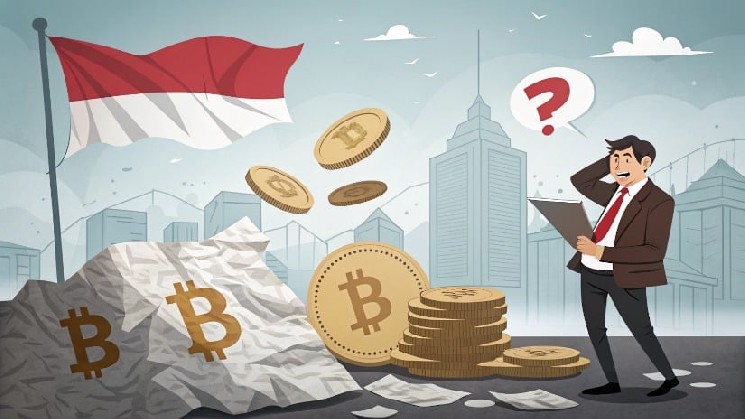Indonesia will implement major tax increases on cryptocurrency trading starting August 1, targeting a market that has grown to over $39 billion in transaction volume. The Southeast Asian nation is more than doubling taxes on domestic crypto exchanges and imposing even higher rates on foreign platforms.
Tax Rates Jump Across the Board
Under the new framework announced by Indonesia’s Ministry of Finance, sellers using domestic crypto exchanges will pay 0.21% tax on each transaction, up from the previous 0.1% rate. The increase is much steeper for overseas platforms, where sellers now face a 1% tax compared to the earlier 0.2% rate.
The government eliminated value-added tax (VAT) for crypto buyers, who previously paid between 0.11% and 0.22%. However, crypto miners will see their VAT double from 1.1% to 2.2%. Starting in 2026, miners will also lose their special 0.1% income tax rate and pay standard personal or corporate tax rates instead.
Finance Minister Sri Mulyani Indrawati said the changes aim to “provide legal certainty for crypto asset trading transactions and adapt to developments in crypto asset trading.”
Massive Market Growth Drives Policy Change
Indonesia’s crypto boom has caught regulators’ attention. The country ranks among the global leaders in cryptocurrency adoption. Monthly transaction volumes have surged dramatically, with May 2025 alone seeing 49.57 trillion rupiah ($3.02 billion) in crypto trades.
The growth reflects Indonesia’s young, tech-savvy population. About 60% of crypto traders are between 18 and 30 years old, taking advantage of mobile-first trading apps. With smartphone usage at nearly 91% nationwide, crypto platforms have found eager users across the archipelago.
Popular trading assets include Tether (USDT), Bitcoin (BTC), Dogecoin (DOGE), and Ethereum (ETH). The surge has been so dramatic that crypto exchange users now outnumber traditional stock market investors in the country.
From Ban to Regulation: Indonesia’s Crypto Journey
Indonesia’s relationship with digital currencies has evolved significantly. In 2017, Bank Indonesia banned cryptocurrencies as payment methods, citing security and volatility concerns. The central bank worried digital currencies could disrupt the financial system.
The story changed in 2018 when the Commodity Futures Trading Regulatory Agency (Bappebti) classified cryptocurrencies as tradable commodities. This allowed legal trading on futures exchanges with strict rules to protect investors.
By 2019, Indonesia had comprehensive crypto trading regulations. The government required exchanges to maintain transaction records for five years, follow anti-money laundering rules, and keep servers within the country.
The sector reached a milestone in July 2023 with the launch of the Commodity Futures Exchange (CFX), the world’s first state-backed cryptocurrency exchange. This government-run platform aimed to increase transparency and better protect investors.
Regulatory Authority Shifts to Financial Watchdog
A major change occurred on January 10, 2025, when regulatory oversight transferred from Bappebti to the Financial Services Authority (OJK). This move reclassified crypto assets from commodities to digital financial assets, bringing them under the same regulatory framework as traditional financial securities.
The transition reflects Indonesia’s more serious approach to crypto regulation. OJK supervises banks, insurance companies, and investment firms, giving crypto assets the same level of oversight as traditional financial products.
All existing licenses and approvals from Bappebti remain valid under the new system. However, crypto companies must fully comply with OJK’s new requirements by July 2025.
Industry Response and Strategic Impact
Tokocrypto, a major Indonesian exchange backed by Binance, welcomed the regulatory changes but requested at least a month-long grace period for businesses to adjust. The company emphasized the importance of stronger oversight for transactions on foreign platforms.
The tax structure creates clear incentives for traders to use domestic exchanges over foreign ones. With domestic platforms taxed at 0.21% compared to 1% for overseas exchanges, the government is pushing crypto activity toward regulated, locally-supervised platforms.
This approach mirrors Indonesia’s broader strategy of supporting domestic businesses while discouraging unregulated foreign competitors. In 2022, the government blocked several major foreign crypto platforms including Binance, Bybit, and Coinbase for lacking proper licenses.
What This Means for Crypto’s Future
Indonesia’s tax increases signal the government’s recognition that cryptocurrency has moved from a niche investment to mainstream adoption. The substantial revenue potential from a $39 billion market makes crypto taxation a significant policy priority.
The differential tax rates between domestic and foreign exchanges reflect Indonesia’s desire to maintain regulatory control while fostering local crypto infrastructure. By making domestic platforms more cost-effective, the government can better monitor trading activity and protect consumers.
Despite higher taxes, industry experts expect continued growth. The young demographic driving crypto adoption shows no signs of slowing down, and improved regulatory clarity may actually attract more institutional investors who previously avoided the sector due to uncertainty.
 bravenewcoin.com
bravenewcoin.com
